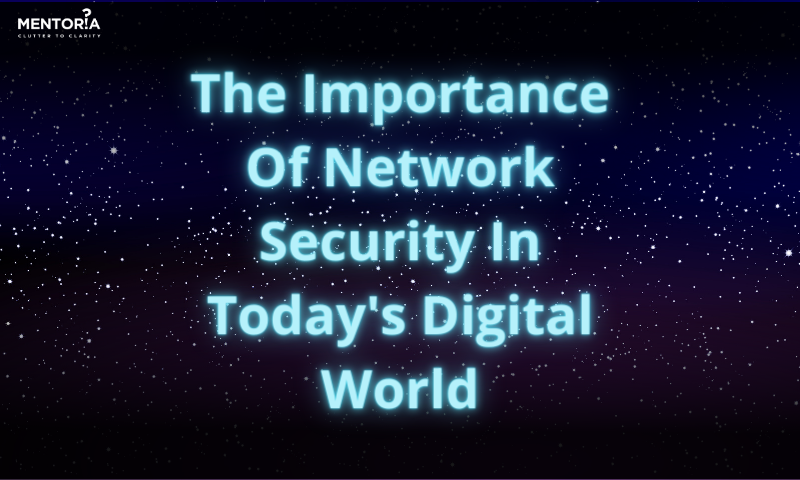The Importance Of Network Security In Today’s Digital World

In today’s digital landscape, where connectivity and information exchange are the cornerstones of our daily lives, the importance of network security cannot be overstated. With the rise in cyber threats and the potential risks they pose to individuals, businesses, and even nations, safeguarding our networks has become paramount. From protecting sensitive data to preventing unauthorised access, network security plays a critical role in maintaining the integrity, confidentiality, and availability of our digital infrastructure. In this article, we delve into the significance of network security and explore the measures necessary to ensure a safe and secure digital environment.
The Digital Frontier: A World Of Connectivity
In this interconnected world, information flows like a digital river. Our personal and financial data, confidential business information, and sensitive government records traverse the vast network of cyberspace. To protect this valuable data from cybercriminals, hackers, and malicious entities lurking in the shadows, the importance of network security cannot be overstated.
Network security refers to the measures and practices put in place to safeguard computer networks and their resources from unauthorised access, misuse, or disruption. It encompasses a range of technologies, processes, and policies designed to detect, prevent, and respond to security threats, ensuring the confidentiality, integrity, and availability of network resources.
Unveiling The Risks
- Data Breaches: We’ve all heard the headlines announcing massive data breaches, where personal information of millions is stolen. These breaches not only compromise our privacy but also leave us vulnerable to identity theft and financial fraud.
- Malware Attacks: Malicious software, or malware, can silently infiltrate our devices, causing havoc. It can disrupt our systems, steal sensitive data, or even hold our files hostage through ransomware attacks.
- Phishing and Social Engineering: Cybercriminals are adept at exploiting human vulnerabilities. Through phishing emails, fraudulent websites, or social engineering tactics, they trick us into divulging our personal information, passwords, or credit card details.
- Network Intrusions: Hackers target both individuals and organisations, exploiting vulnerabilities in networks to gain unauthorised access. Once inside, they can wreak havoc, steal sensitive information, or cause widespread disruption.
Securing The Digital Fort: The Importance Of Network Security
- Protecting Personal Privacy: Network security measures, such as firewalls, encryption, and secure browsing practices, safeguard our personal data and shield our privacy from prying eyes. According to recent studies, data breaches exposed over 36 billion records in 2021 alone, highlighting the urgent need for robust network security measures to protect individuals’ privacy.
- Safeguarding Financial Transactions: With the rise of online banking and e-commerce, network security becomes critical in securing our financial transactions. In 2022, the global online payment fraud loss reached a staggering $22 billion, underscoring the critical role of network security in preventing financial fraud. Secure protocols and encryption ensure that our sensitive financial information remains confidential during transit.
- Preserving Business Integrity: For organisations, network security is paramount. It protects valuable intellectual property, customer data, and trade secrets. Implementing robust security measures safeguards their reputation and ensures uninterrupted business operations.
- Preventing Disruption and Downtime: Network security measures help prevent cyberattacks that can disrupt critical services, causing downtime and financial losses. By fortifying our networks, we ensure smooth operations, whether for individuals, businesses, or public institutions.
Empowering Ourselves: Tips For Network Security
- Strong Passwords: A robust network security strategy starts with strong passwords. Create unique, complex passwords for each online account and consider using password managers for added convenience and security.
- Regular Software Updates: Keep your operating system, antivirus software, and applications up to date. Software updates often include security patches that fix vulnerabilities and protect against emerging threats.
- Secure Wi-Fi Practices: Secure your home Wi-Fi network with a strong password and encryption. Avoid using public Wi-Fi networks for sensitive activities like online banking, as they are often unsecured and susceptible to eavesdropping.
- Be Wary of Phishing Attempts: Stay vigilant against phishing emails, suspicious links, or unsolicited requests for personal information. Verify the legitimacy of websites before entering sensitive data and be cautious of sharing personal details over the phone.
Mentoria’s Role In Network Security
In this digital era, network security is not an option; it’s a necessity. As we navigate the interconnected web of technology, understanding the risks we face and implementing robust security measures become paramount. By protecting our personal privacy, securing financial transactions, preserving business integrity, and preventing disruption, we can fortify our digital fortresses and explore the vast possibilities of the digital realm with confidence. With Mentoria’s expert mentors and resources, you can stay ahead of the curve and ensure a secure digital future. So, let’s raise our digital shields, lock our virtual doors, and embark on a safer and more secure digital journey together!









